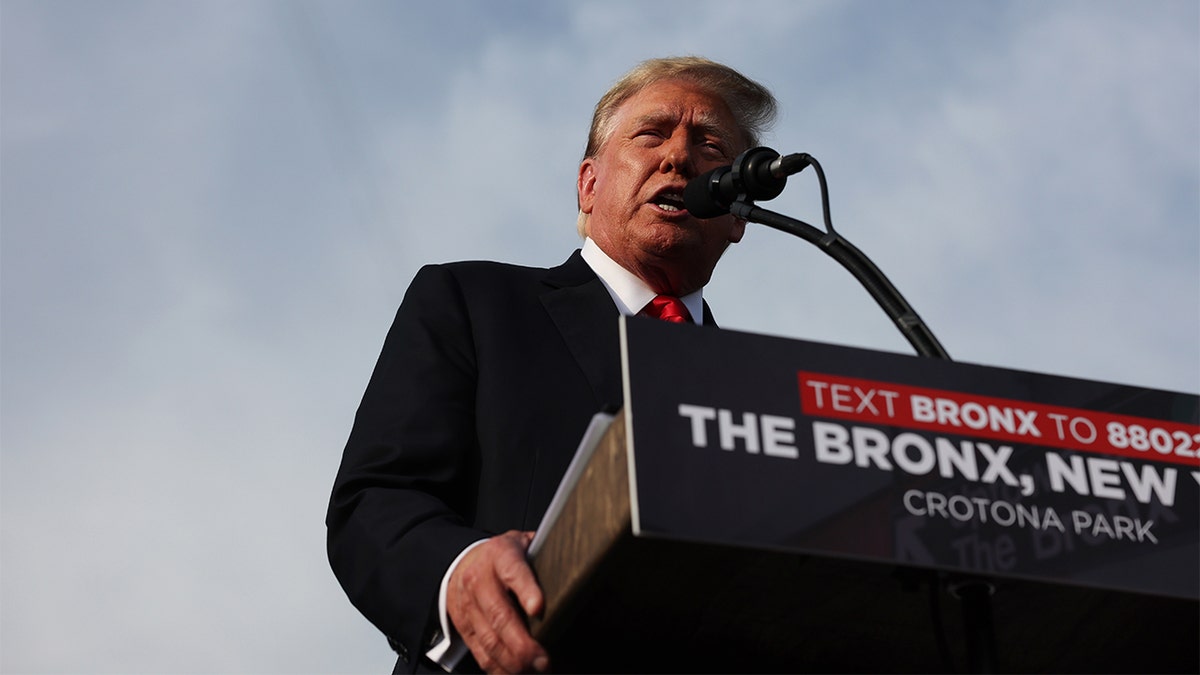Why Trump's blue district barnstorming is a bad sign for Biden
No, Trump is not going to win a majority of the voters in North Philly or the Bronx, but that's not really the point. The point is that he is showing up and offering a real alternative.

Former President Donald Trump is set to speak in North Philadelphia on Saturday, the next stop in what has been an unconventional but highly effective strategy of his 2024 presidential campaign.
It all started, as so many things in life do, with a trip to a bodega in New York City, and now it is a staple of the former president’s third run at the White House.
Back in April, at the beginning of a criminal trial that would limit his campaigning for weeks, Donald Trump showed up after court at a small locally owned store in Harlem for an impromptu and mostly organic little rally.
TRUMP CATCHES UP TO BIDEN IN CASH DASH, BUT CAN HE SPEND THE MONEY IN TIME?
Within minutes, social media blew up with images of a diverse crowd chanting Trump’s name, with a kind of celebrity appeal we have not seen from a politician since at least Barack Obama.
Next, Trump took his show to the Wildwood boardwalks of deep blue New Jersey, then to a rally in the Bronx, next to an event in a black church in Detroit, and on Saturday Trump will deliver remarks in North Philadelphia.
For those who don’t know much about North Philly, it's one of the roughest neighborhoods in one of the roughest cities in America. The mostly Black and Hispanic residents have suffered generations of crime, drugs, and poverty under Democrats' leadership.
But it is also the kind of place where Republicans often fear to tread, or maybe just haven’t bothered to, because they don’t actually think they can win there.
And no, Donald Trump is not going to win a majority of the voters in North Philly or the Bronx, but that's not really the point. The point is that he is showing up, he is listening, and he is offering frustrated Democratic voters a real alternative.
Frankly, the timing could not be better, after all residents of poor urban neighborhoods are hurting the most under Joe Biden’s anemic economy and all the while watching the president’s policies give illegal immigrants hotel rooms, food, even cash cards.
BIDEN HAS A MASSIVE MAY FUNDRAISING HAUL, BUT COMES UP FAR SHORT OF TRUMP
Trump doesn’t have to win these places, if he can just move the needle, as polls already show him doing, especially in swing state cities like Philly, Atlanta, and Detroit, then Biden’s path to a second term will be as narrow as a needle's eye.
Another advantage for Trump in this blue district barnstorming is that, as is true with much in this election, Joe Biden cannot even come close to replicating it.
Joe Biden can’t walk into ruby red small towns and hold events. First of all, he has made clear that he considers most of those voters to be dangerous MAGA extremists, and second, he clearly just couldn’t handle the rigor of these kinds of rallies.
Biden’s only real pitch to minority voters, beyond, if you don’t vote Democrat, you ain’t Black, is that Trump is some kind of awful racist, but even that tired claim is losing whatever purchase it may once have had.
Voters want to be heard, they don’t want to be taken for granted, which is why just showing up has proven so effective for Trump.
CLICK HERE FOR MORE FOX NEWS OPINION
Republicans not named Trump might learn some lessons here too. Maybe the Grand Old Party is too willing to concede to minority or urban voters. Maybe the Democrats' hegemonic power in these areas is finally being seen as the decades-long disaster it has been.
If Trump’s rise to power in a once stuffy and staid GOP represents anything, it is that the fundamentals of American politics are changing. Once impossible things are happening. And with the Democrats continuing to lurch to the loony left, anything really could happen.
It has widely been noted that prior to Donald Trump, the last Republican candidate for president who appeared in the Bronx was Ronald Reagan, another politician with the power to redraw well-worn political maps.
That was in 1984, but four years earlier, at a debate against Jimmy Carter, the Gipper introduced a new question to the American political lexicon when he asked, "Are you better off than you were four years ago?"
Today, in North Philly, Trump will pose that very same question to the gathered crowd, and there is growing evidence to believe that for many of those assembled, the answer is a resounding no.
Win or lose, Trump deserves credit for reaching out to all Americans. In the end, it is the only thing that can pull our fractured society back together.


